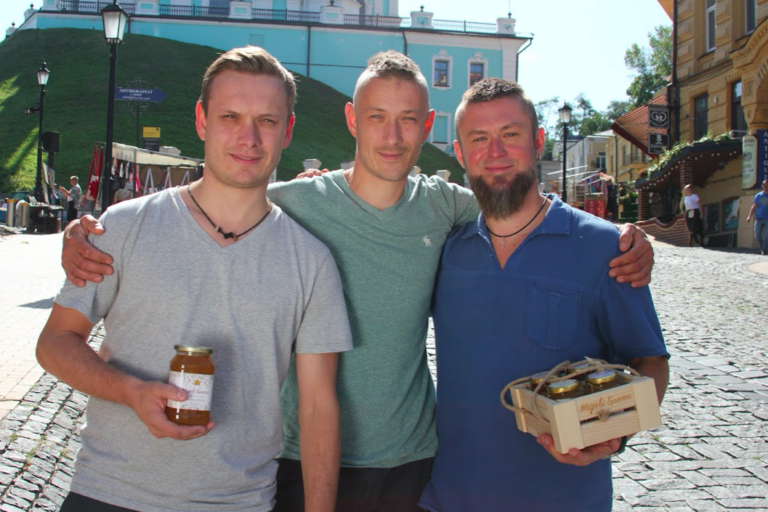Beyond the Jar Part 1:
A Ukrainian Story of beekeeping and brotherhood

We spoke to Dmytro Kushnir, co-founder and CEO of Ukrainian company Honey Brothers, about the importance of local and independent beekeeping, the connection between honey and the environment, and how beekeepers in Ukraine are supporting resistance efforts.
Where are you right now?
I’m sitting in my house in the outskirts of Kiev, in the area that has been occupied by Russia for a month.
How did Honey Brothers start?
I worked as an international business consultant for more than 15 years, and have been an entrepreneur since 2012. In 2014, I noticed a huge interest from international buyers in Ukrainian honey. This is how honey found me. I have three brothers – I’m their cousin, but in Ukraine ‘brother’ is the same. The middle brother has 15 years of experience with beekeeping. He was doing it as a hobby – like many Ukrainians. We created Honey Brothers together in 2016. The name explains everything – we are brothers united by honey. It started off like a very fun adventure and with time I really fell in love with honey. Our beehives are located in this fantastic place in Southern Ukraine, in the great Southern Bug river valley which is really beautiful, having lots of endemic flowers. So, we started communicating about our honey being from this specific place.
How would you describe Honey Brothers now?
Honey Brothers is a community – we are small but ambitious. I was asking myself: what are the great unique places we have in Ukraine? I was looking for beekeepers in these places and explaining to them what we wanted to do. The whole idea of Honey Brothers is to create this really local belonging of honey to the place. Now, we are not only three brothers, we are a community of beekeepers – we are currently working with six beekeepers in five different regions of Ukraine. We produce honest and rare honey and I try all of the honeys because if I don’t like it, I don’t want people to eat it.
What attracted you to beekeeping and honey?
Beekeeping and honey is an activity and a product which are not yet explored by humans. There are so many things that we don’t know and that we don’t understand – it’s a fantastic world you can explore your whole life. Until now, I’ve been working much more with honey as a product rather than with bees. From this year on, I will get much more involved with beekeeping. I want to be closer to nature and to communicate more with nature. We, as humanity, have lost this notion of understanding ourselves as a part of nature, and it’s wrong. We are a part of nature, we must cooperate with nature, and we have to respect the environment and every living creature. It’s very important for ourselves and our wellbeing. Spending time in nature makes us feel good and completed. We need to rebalance and reconnect with nature, and this is what I am trying to do.
What are you trying to achieve?
Our mission is to work on the promotion of Ukrainian honey. Ukraine is a global honey producer – one of the largest in the world – but unfortunately consumers in different countries just don’t know they are consuming Ukrainian honey and I think it’s a huge problem. Honey has always been here, for thousands of years and it is one our most important products. Ukraine is known right now in the world, I think everyone knows the word, but there’s still lots of work to be done to promote our products – there’s not only mass production, but also really unique and high-quality products.
How intrinsic is the connection between honey and the place where it’s produced?
The connection between honey and the environment is something capital. The honey and the place have a huge connection; every place is unique – the flora, the microclimate, everything – and the uniqueness of the place makes the uniqueness of the honey. From this point of view, honey is really something like wine.
Why is local and independent beekeeping important?
It is important to understand the diversity of the natural environment and the uniqueness of every flower that grows around us. We just have to enjoy this diversity and celebrate it – it makes us so rich. I’m really eager to discover honey all around the world and enjoy this diversity. And we have to fight for it, we have to be proud of it and do everything we can to preserve it in front of globalisation. We wouldn’t have this diversity if we had homogenised agriculture or homogenised nature everywhere.
What can consumers do?
The best thing consumers can do to act more responsibly is to find out more about what they consume. Honey is one of three most adulterated products in the world alongside olive oil and milk. Consumers are getting fooled – industrial producers are selling some kind of yellow and sweet liquid saying its honey, but actually its coming from a factory and bees haven’t even seen it. Consumers can try to learn more about honey – how it’s made and the connection with the environment – and pay attention to what they are buying. They can help makers of ‘true’ honey by not buying industrial and supporting local and small producers.
How has Honey Brothers been supporting Ukraine’s resistance forces?
Since last year four of our six beekeepers are fighting on the frontline. In Ukraine, there is a custom during hard times like now of revolution of war – people just stand up and help. There are many volunteers, everyone is asking themselves: what can I do to help? There is an old Ukrainian proverb, ‘whoever has honey has strength,’ so beekeepers, they send honey, it’s normal. The first thing we did was send honey to the frontline. It’s nothing exceptional, everyone is doing something. This is what makes our resistance strong because everybody is united – like bees! Maybe the strong roots of beekeeping in Ukraine have an impact on our ability to rally together in times of danger.
What are your plans for the future?
Right now, I am launching a charitable foundation to keep on helping Ukrainian resistance forces. We will be helping with everything we can to bring victory closer to our country. After the war we will set up a rehabilitation centre for soldiers using apitherapy (an alternative therapy that uses products made by honeybees for medicinal purposes), including sleeping on beehives, which is believed to have a number of benefits for people suffering from PTSD. My brother has been on the frontline for over a year now. I want him to come back and for us to go to our beehives together and get back to work as we always did. I believe after the victory of Ukraine we will be brand new honey brothers, and even better than before.
How can people support you?
would be very grateful for any support. Everything from sending a message of solidarity to us, to supporting small communities of beekeepers and buying our honey.
Discover more about Honey Brothers:
Facebook and Instagram – @honeybrothers.ukraine
Twitter – @honeybrothersUA
Also check out their charity – https://www.harmata-fund.org/


